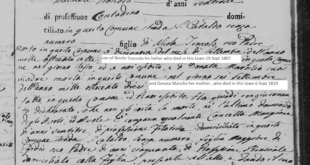Francesco Patierno’s 2016 documentary “Naples ’44” was adapted from the book of the same name by Norman Lewis, a British intelligence officer stationed there during World War II. It is narrated by British film and TV star Benedict Cumberbatch.
The documentary is a strong dose of reality that intermixes archival footage, old cinema clips, dramatizations and the recollections of an officer who witnessed unfathomable atrocities. Patierno’s film is informative, riveting, and at times shocking.
“The inspiration to make this film came from my father,” Patierno said in a 2018 interview with Fra Noi. “One day, he told me about how he had escaped death only because he was on the righthand side of the road. All those on the left died because they were shot by a machine gun being fired from an airplane,” He said. “If you want to know more, read ‘Naples ’44’ because it’s a very interesting book not only about the period during the war but it’s also significant in understanding the Neapolitan people in general. I read this book and I fell in love. So from there, the idea came to me right away to make a film.”
We learn in the opening sequences of that Allied troops mounted a surprise landing at Salerno in German-occupied Italy nine months after D-Day. Excerpts from Lewis’ diary follow, narrated by Cumberbatch. Among the shocking revelations are the devastating delayed-action devices left by the Germans before they departed from Naples. Several hundred mines were buried under principal buildings. These bombs would randomly explode with no warning in the middle of busy piazzas. Lewis described the bombings as “a senseless massacre perpetrated on the Italian civil population.”
The Neapolitans people suffered greatly in the coming months, not just as a result of the bombings. but also because of diseases like typhus and malaria that spread throughout the population. “The war pushed the Neapolitans back into the Middle Ages,” Lewis declared.
Lewis spent about a year among the Italians. Over that year, he grew to admire and respect them for all they were forced to endure. Patierno’s documentary reflects that admiration by lending a voice and images to Lewis’ written testimony.
To stream the film on Apple TV, click here.
 Fra Noi Embrace Your Inner Italian
Fra Noi Embrace Your Inner Italian







